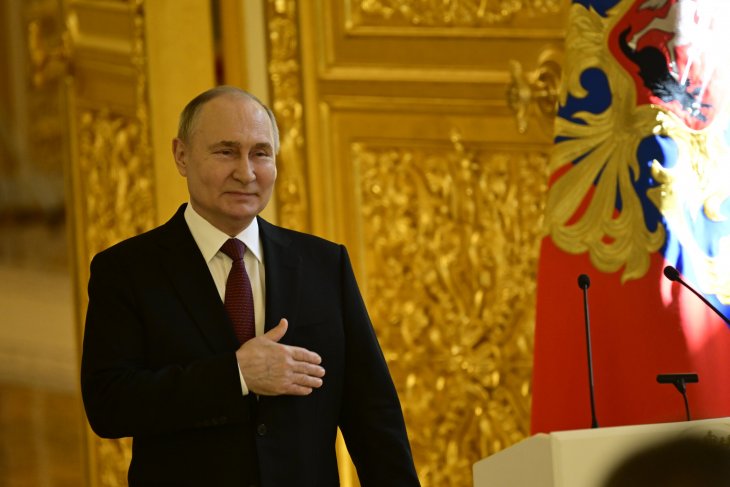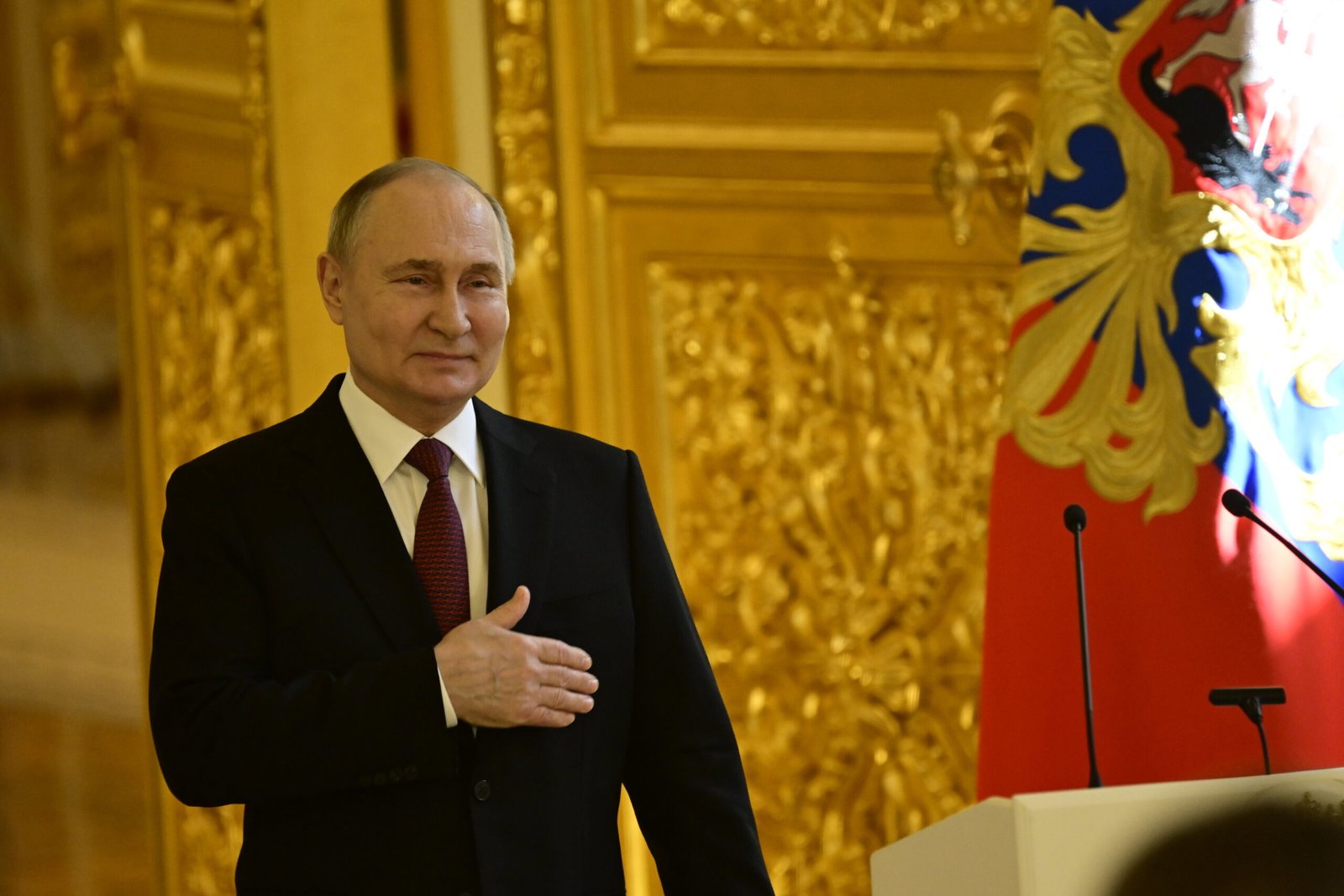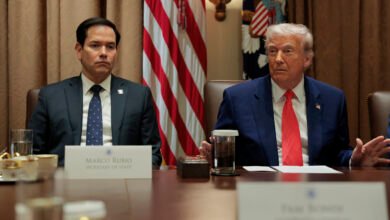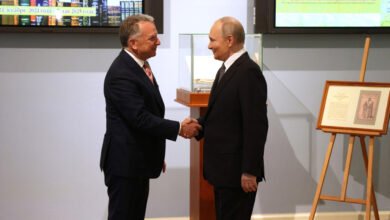The official results from last week’s Russian presidential election were precisely what the Kremlin ordered, but they have hardly brought the incumbent Vladimir Putin much satisfaction.

Vladimir Putin meets with election campaign activists at Kremlin in Moscow, Russia on March 20,2024. (Photo by Sefa Karacan/Anadolu via Getty Images)
Falsifications in the results were so blatant that Putin’s desire to prove overwhelming public support for the continuation of his autocratic rule has remained unfulfilled. Instead of discipling the political elites, he may have inadvertently informed them about the limits of his control and the infirmness of his grasp on power (Meduza, March 20).
Despite extra-tight administration and security measures, several surprises have exposed fragilities in the seemingly solid system of Putin’s power.
Ukraine is responsible for a few of these surprises, delivering a series of remarkably precise drone strikes on Russian oil infrastructure. These strikes targeted infrastructure as deep inside Russian territory as the Samara oblast, where the Kuibyshev oil refinery burst into flames last Friday (RBC, March 23). The cumulative impact on the Russian oil industry, affected by sanctions that have caused many technical breakdowns, is more significant in the domestic petroleum market than in the export of crude oil (The Moscow Times, March 20). Moscow responded with a massive strike on the Ukrainian energy infrastructure, but the electricity grid in the country is now more resilient than it was in the brutal winter of 2022–2023 (Novaya gazeta Europe, March 22).
Another worrisome development was the incursion into the Belgorod and Kursk oblasts of Russia by Russian armed formations, which recruit and train volunteers eager to fight against Putin’s regime (NV.ua, March 21; TASS, March 22). Putin warned about a “cordon sanitaire,” a restriction of movement in certain regions, that would protect Russian regions against raids and artillery barrages (Forbes.ru, March 18). Seeking to make this threat more forceful, he also ordered a massive missile strike on Kyiv, which, however, failed to register a single precise hit due to effective Ukrainian air defense (Krym-Real, March 22). The shockingly low quality of Russian weapons was illustrated by an accidental missile hit on the Captain Lobanov fishing trawler during an exercise of the Baltic Fleet near Kaliningrad (Media-Zona, March 21).
The deadlock in the high-intensity battles in Ukraine has led to a significant change in official discourse: Putin’s long-serving press secretary, Dmitry Peskov, announced that the “special military operation” had turned into a real war (TASS, March 22). He then clarified that the “legal status” of the operation has not changed, but the expanding involvement of the West had essentially transformed it into a war (Vedomosti, March 22). These rhetorical exercises set the context for a plan Defense Minister Sergei Shoigu announced for building two new combined arms armies of 14 divisions and 16 brigades (Interfax, March 20; see EDM, March 21). The loudly-trumpeted recruitment campaign cannot compensate for the heavy losses in the ongoing frontal attacks. Shoigu’s big plans can only be implemented by a new wave of mobilization, yielding an additional 300,000 soldiers (Verstka-Media, March 22).
The previous “partial” mobilization in September 2022 caused serious social discontent. It triggered a mass emigration of young men, so the Kremlin had denied—up to the elections—any intention to repeat that compulsory measure (RTVI, March 14). In military-strategic terms, the need to triple the number of fresh conscripts that the spring draft would yield is imperative as Putin demands new advances to prove that Russia commands the initiative (Re:Russia, March 21). In political terms, however, this decree could mar the beginning of Putin’s new presidential term because public opinion, to the degree it can be evaluated, shows a strong preference against mobilization (Levada, March 5; Novaya gazeta Europe, March 14).
The Kremlin encountered three domestic surprises during its campaign to turn the elections into a referendum on the indefinite continuation of war (Republic.ru, March 18). First, Boris Nadezhdin, a potential presidential candidate with a cautious intention to end the war, received strong public support and was removed from the competition (Radio Svoboda, February 9). Second, the level of grief shown by the crowds that gathered for the funeral of Alexei Navalny, a defiant opponent of Putin’s regime, who was murdered in an Arctic prison and buried in the small Borisovsky cemetery in Moscow’s Maryino District, demonstrates the rising discontent in Russia (Carnegie Politika, March 4). Third, many Russians gathered at polling stations at noon on Sunday, March 17, to protest Putin’s new term, an action Navalny called for before his death (PoldenprotivPutina.org, March 17).
The deadly terrorist attack in the Moscow suburb of Krasnogorsk last Friday, executed by the revived ISIS-K group, revealed the depth of insecurity in Russia (Meduza, March 24). Russian security services were, and continue to be, too busy investigating and persecuting anti-war activists to give due attention to the threat of Islamic extremism, even when US officials informed them of a possible attack (Kommersant, March 23). Addressing the Federal Security Service (FSB) collegium four days before the massacre in the Crocus City Hall, Putin dismissed the message as “blatant blackmail” aimed at destabilizing Russia (Izvestiya, March 19). In a statement made the day after the terrorist attack, he did not mention the US warning and sought to establish a Ukrainian connection, ordering more missile strikes on Kyiv and Lviv (MK.ru, March 23). For “patriotic” Russian commentators, the shock caused by the terrorist attack is merely a means for boosting anti-Ukraine slander while touting that examining the real causes of a new proliferation of Islamist networks is irrelevant (TopWar.ru, March 23; Izvestiya, March 23).
Lies and false outrage cannot generate a semblance of unity in Russian society, traumatized by an unwinnable war and disappointed in Putin’s self-serving leadership. The tragedy at the concert hall blends with the stream of news about apartment houses hit by missiles and villages devastated by bomb blasts. Putin’s reign, which started with horrible explosions in Moscow in September 1999, appears to have come full circle to another surge of terrorism sprouting up from domestic discord.
At the turn of the millennium, Russia put trust in a new, energetic leader who promised to deliver a better future. This leader has since turned into an aging autocrat obsessed with the imperial past and perpetuating a disastrous war. Domestic stability and expanding ties with the West were prospects that appeared to open Russia to a road of reforms. The latter has turned into a dangerous confrontation and the former into turmoil and repressions where societal militarization has nullified reform plans. Another six years of Putin is too long for the fast-deteriorating state waging a self-defeating war.
Source link




